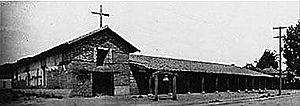Mission San Francisco Solano (California)

Mission San Francisco Solano circa 1910
|
|
|
Location of Mission San Francisco Salono in California
|
|
| Location | 114 East Spain Street Sonoma, California |
|---|---|
| Coordinates | 38°17′38″N 122°27′21″W / 38.29389°N 122.45583°WCoordinates: 38°17′38″N 122°27′21″W / 38.29389°N 122.45583°W |
| Name as founded | Misión San Francisco Solano |
| Patron | Saint Francis Solano of Montilla, Spain |
| Nickname(s) | "Sonoma Mission" |
| Founding date | July 4, 1823 |
| Founding priest(s) | Father José Altimíra |
| Founding Order | 21 |
| Military district | Fourth |
|
Native tribe(s) Spanish name(s) |
Coast Miwok, Patwin, Pomo, Suisunes, Wappo |
| Native place name(s) | Huchi |
| Baptisms | 1,563 total |
| Marriages | 359 total |
| Burials | 896 total |
| population | 996 in 1832 |
| Governing body | California Department of Parks and Recreation |
| Current use | Museum |
| Reference no. |
|
| Website | |
| http://www.parks.ca.gov/?page_id=479 | |
Mission San Francisco Solano was the 21st, last and northernmost mission in Alta California. It was the only mission built in Alta California after Mexico gained independence from Spain. The difficulty of its beginning demonstrates the confusion resulting from that change in governance. The California Governor wanted a robust Mexican presence on the Pacific coast from moving further inland. A young Franciscan friar from Mission San Francisco de Asis wanted to move to a location with a better climate and access to a larger number of potential converts.
The Mission was successful given its short eleven year life but was smaller in number of converts and with lower productivity and diversity of industries than the older California missions.
The mission building is now part of the Sonoma State Historic Park and is located in the city of Sonoma, California.
Fr. José Altimira age 33, arrived from Barcelona, Spain to serve at Mission San Francisco de Asís. The mission was not thriving because of its climate and had established a medical asistencia ("sub-mission") in San Rafael to help the mission’s ill neophytes (baptized Native Americans) recover their health. California Governor Luis Argüello was interested in blocking the Russians at Bodega Bay and Fort Ross from moving further inland. Together they developed and presented to the party church authorities and the territory (legislature) a plan for moving Mission San Francisco de Asís and the San Rafael asistencia to a new location north of the Bay. The legislature approved but the church authorities did not respond (they had forwarded the plan to their superiors in Mexico). Under the old Spanish regime, founding a new mission required the approval of both New Spain's Bishop and the King’s Viceroy.
...
Wikipedia

